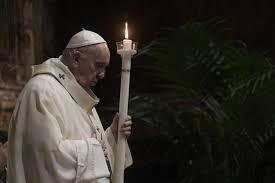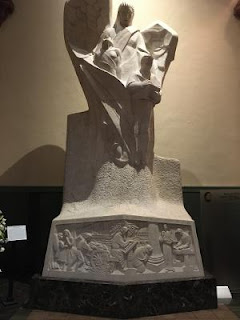Inevitably, in our contemporary time and place, when Advent arrives we are already immersed in our annual, year-end Christmas extravaganza of celebrations of all sorts – Christmas music, Christmas cards, Christmas parties, and, above all, Christmas shopping! Advent, with its penitential purple vestments, seems somewhat restrained amid all this holiday exuberance. Our modern holiday season is an exciting, extravagant, celebratory time. At its best, it is in Charles Dickens’ famous words: « a good time: a kind, forgiving, charitable, pleasant time: the only time I know of in the long calendar of the year, when men and women seem by one consent to open their shut-up hearts freely, and to think of other people below them as if they really were fellow-passengers to the grave, and not another race of creatures bound on other journeys. »
At the same time, in the Church’s calendar, these final weeks of the year, beginning with All Saints Day and continuing into Advent, invite us to focus on the coming of God’s kingdom. If November’s emphasis is on a sober consideration of our natural human limits and the eventual end of all things – Dickens’ fellow-passengers to the grave – Advent continues that theme with increasing tonal emphasis on our hope-filled joyful expectation of the renewal of all things in Christ.
Meanwhile, the proximity of Christmas invites us to remember Christ’s first coming, which we will soon commemorate and which we are already anticipating in all our society-wide pre-Christmas celebrations. That first coming of Christ challenges us to recognize and respond to Christ’s presence and action among us, here and now, which in turn prepares us for Christ’s promised return – Christ yesterday, today, and tomorrow. As Saint Augustine famously said: Let us not resist his first coming, so that we may not dread the second [Discourse on Psalm 95].
Ostensibly the most future-oriented of seasons, Advent is thus really a sort of symbol for the entire Christian life, lived (as it inevitably must be) in the present – between the first coming of Christ and his hoped-for final advent. As Christians, we live our lives literally in this interval between Christmas and the end. And that is what Advent is all about. As Pope Saint John Paul II said in 2002: “the whole of our life must be an ‘advent,’ a vigilant awaiting of the final coming of Christ. To predispose our mind to welcome the Lord who, as we say in the Creed, one day will come to judge the living and the dead, we must learn to recognize him as present in the events of daily life. Therefore, Advent is, so to speak, an intense training what directs us decisively toward him who already came, who will come, and who comes continuously.”
Perhaps among puritanical liturgists and other similar scolds, Advent is considered a competitor to Christmas. But Advent is not in competition with Christmas. Advent is not in competition with anything – except complacency. Be sure of this: if the master of the house had known the hour of the night when the thief was coming, he would have stayed awake and not let his house be broken into (Matthew 24:43).
Now the rituals and symbols of Advent, as we celebrate Advent in the Church today, rely a lot on the seasonal imagery of darkness and light that defines this time of year in our northern hemisphere. Recently re-popularized folkloric customs like Advent wreaths with their evergreens and candles are all reflections of that. Symbolic beings that we are, we readily respond to such imagery. and the imagery is indeed beautiful and attractive and comforting. That said, Advent uses seasonal symbolism, but Advent is more than some sort of seasonal pageant. The Christian life is not a season, nor is it a play. The world really was in darkness before Christ – the darkness of alienation from God. But unlike natural darkness the world’s alienation from God is not some abstract natural force.
Moreover, we are the ones who have contributed – and continue to contribute – to the world’s darkness. For this reason, Advent has long been observed as a genuinely penitential season. Thus, Pope Innocent III (1161-1216, Pope 1198-1216) prescribed black as the liturgical color for Advent – although purple eventually beat black to become the season’s official color. Conveniently, purple simultaneously symbolizes repentance but also royalty – Christ the King coming in glory.
If Advent is properly understood as a penitential season (even while we are immersed in our families, at work, and on the city streets in holiday celebrations of all sorts), what is the penance appropriate to Advent? The answer was long ago given by Saint Paul, in words with which Advent traditionally begins: throw off the works of darkness and put on the armor of light (Romans 13:12).
If that be so, then we need to ask ourselves, exactly what is it that keeps us in darkness? Why isn’t the light of Christ shining forth from us and through us to light up the world? Paul’s words challenge us to be attentive to what is happening right now. Living as we do in a culture of institutionalized irresponsibility, Advent’s message is a radical wake-up call to mean what we say – to mean really to throw off the works of darkness and put on the armor of light.
Advent, we are often told, is all about waiting – for what has already begun with Christ’s first coming to be completed at his final coming. But the fact that Christmas is already here in our daily activities and celebrations complicates that experience. Any anyway most of us really aren’t very good at waiting, which may be why we rush into Christmas so quickly.
The good news of Advent, however, is that it is precisely the present that matters. Jesus’ warning in this Sunday’s Gospel [Matthew 24:37-44] about the days of Noah, reminds us how fundamentally common, how universal, the experience of the present really is, in spire of everything that is going on and everything that is going wrong in our world, here we are are still eating and drinking, marrying and giving in marriage – just as it was up to the day that Noah entered the ark. The fact that the present time is limited should make it all that more precious, ought to make it matter that much more, because what I do now, the way I live now, the kind of person I am becoming here and now, that is the kind of person I will be when the Lord comes, and so the person I am going to remain for all eternity.
Almighty God, give us grace that we may cast away the works of darkness, and put upon us the armor of light, now in the time of this mortal life in which thy Son Jesus Christ came to visit us in great humility; that in the last day, when he shall come again in his glorious majesty to judge both the quick and the dead, we may rise to the life immortal; through him who liveth and reigneth with thee and the Holy Ghost, one God, now and for ever. Amen.
[Advent Collect, Book of Common Prayer]




